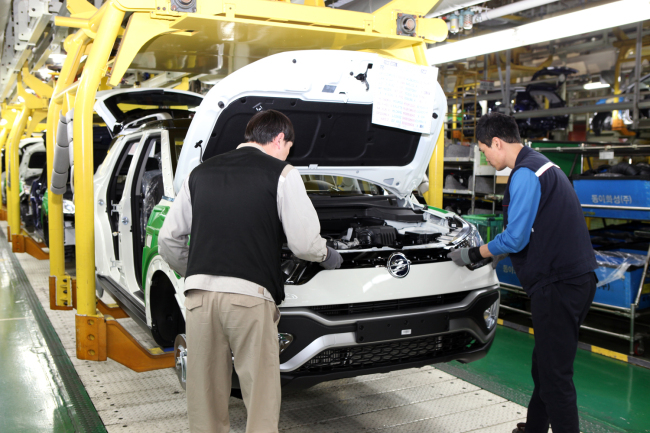PYEONGTAEK, Gyeonggi Province -- The three-car assembly lines of Ssangyong Motor, located in Pyeongtaek, Gyeonggi Province, were bursting with vitality this month, switching away from the pessimism and insecurity that dominated the lines in 2009 when the company conducted mass layoffs after filing for court receivership.
Slogans hung on the wall, like “The world is waiting for the wonderful Tivoli!” and “Journey to success with Tivoli!” reflected the vibrant atmosphere of the plant.
“Tivoli is a small yet strong source of hope for us,” said Song Seung-ki, managing director and head of production at Ssangyong.
The Korean branch of India's auto giant Mahindra & Mahindra launched its first compact SUV in January 2015.
Ssangyong’s new car was a latecomer to the segment, but -- armed with a stylish design, exceptional driving performance and affordable price -- became the best-selling compact SUV within a year.
The Korean automaker sold 63,693 Tivoli cars at home and abroad last year, setting a new annual sales record as a single model, replacing the high-end Rexton SUV record, whose sales reached 54,274 units in 2004.
The sales growth of Tivoli led the company’s turnaround in the fourth quarter last year for the first time in eight quarters.
“About 4,700 workers at the Pyeongtaek plant are working day and night even on weekends to meet the increased demand for Tivoli SUVs,” said Moon Sung-ryul, an executive technician who joined Ssangyong in 1995.
In addition, Tivoli Air, a long-body version of Tivoli, launched last month, is boosting the sales growth, expanding Tivoli's presence in the market to the mid-size SUV segment.
Among three assembly lines, Lines 1 and 2 where the Tivoli series are built were filled with energy, with workers installing parts onto the monocoque bodies. Some were holding lights and double-checking the vehicles while others were mounting tires.
Due to increased production volume, the firm recently altered the second assembly line so that it could also produce Tivoli cars, along with the first.
“We are making 367 Tivoli cars a day on Line 1. A flood of orders keeps the line running even on holidays,” said Song Yong-seung, deputy general manager of the first assembly line.
The Tivoli boom not only brought life back to the plant, but also returned jobs to 24 employees whom the company had parted with during its crisis in 2009. In addition, the company hired 16 new employees this year whose parents had to leave Ssangyong at that time.
Tivoli, however, is not a cure-all. Ssangyong still has many tasks to do in order to restore its past glory as a classic SUV-maker.
One of the tasks ahead is to lift the plant operation rate. As of this month, the operation rate of Pyeongtaek plant stands at 58 percent. The firm said it will raise the rate to 100 percent within four years.
The recovery in exports is another urgent task for Ssangyong. The firm’s outbound shipments continued to draw a downward trend in the first quarter of this year.
“We expect 2016 will be a tough year due to volatile business conditions, but we’ll keep doing our best to turn into a profitable firm this year,” the head of the production unit said.
“Eventually, we want to restore our old honor and grow into a global SUV-maker like Land Rover or Subaru.”
By Hong Sung-pyo (
hong1@heraldcorp.com)







![[From the Scene] At this Starbucks, you need ID: Franchise opens store with view of North Korea](http://res.heraldm.com/phpwas/restmb_idxmake.php?idx=644&simg=/content/image/2024/11/29/20241129050068_0.jpg)
